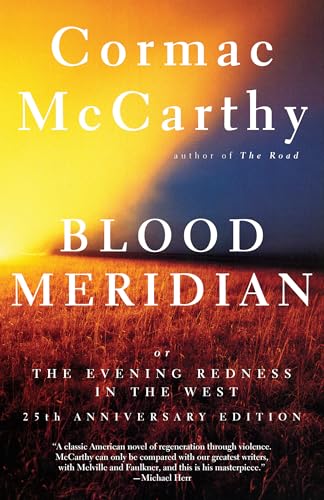 Then about the meridian of that day we come upon the judge on his rock there in that wilderness by his single self. Aye and there was no rock, just the one. Irving said he'd brung it with him. I said that it was a merestone for to mark him out of nothing at all. He had with him that selfsame rifle you see with him now, all mounted in german silver and the name that he'd give it set with silver wire under the checkpiece in latin: Et in Arcadia ego. A reference to the lethal in it.
Then about the meridian of that day we come upon the judge on his rock there in that wilderness by his single self. Aye and there was no rock, just the one. Irving said he'd brung it with him. I said that it was a merestone for to mark him out of nothing at all. He had with him that selfsame rifle you see with him now, all mounted in german silver and the name that he'd give it set with silver wire under the checkpiece in latin: Et in Arcadia ego. A reference to the lethal in it.Et in Arcadia ego: "And I am even in Arcadia." That is to say that I, Death, am present everywhere--even in utopia.
I have read three of his books now (this one, The Road, and No Country for Old Men) and I can say with assurance that no one, horror writer or otherwise, writes books as terrifying as Cormac McCarthy. The Road was a post-apocalytpic tale of of a man and his son set out in a barren wasteland, No Country a tale of violence strewn across the Texas-Mexico border in 1980. Blood Meridian is much like that--even set in the same place--but 130 years ago. The plot is simple to describe: An unnamed teenager called "the kid" heads out West and joins up with a group of scalphunters under John Joel Glanton. Glanton and his associates are historical figures, and McCarthy uses as his principle source a book called My Confession by Samuel Chamberlain, a firsthand account of the travails of the Glanton gang.
Chamberlain's book describes the principle villain of Blood Meridian, Judge Holden--usually just called "the judge"--this way:
The second in command [. . .] was a man of gigantic size called ‘Judge’ Holden of Texas. [. . .] He stood six feet six in his moccasins, had a large fleshy frame, a dull tallow face destitute of hair and all expression. His desires was blood and women. [. . .] Holden was by far the best educated man in northern Mexico; he conversed with all in their own language, spoke in several Indian lingos, at a fandango would take the Harp or Guitar from the hands of the musicians and charm all with his wonderful performance, and out-waltz any poblano of the ball. He was ‘plum centre’ with rifle or revolver, a daring horseman, acquainted with the nature of all the strange plants and their botanical names, great in Geology and Mineralogy, in short another Admirable Crichton, and with all an arrant coward. (Chamberlain 271-72)
McCarthy's judge is that and more; he is a mysterious cipher devoted to violence and destruction. He is extremely intelligent, forever sketching and taking notes of local flora and fauna in his notebook, but wherever he goes, children end up disappearing and are found later assaulted and mutilated. The quote I opened the post with is his creation myth, in a way; it describes how the Glanton gang came upon him out in the desert one day, sitting on a rock--the only rock--just waiting for them. As they are out of gunpowder, he leads them on a multi-day trek to gather guano and sulfur from the mouth of a volcano to make some just in time to massacre a pursuant band of Indians.
Noted critic Harold Bloom called the judge "the most frightening figure in all of American literature." Is that true? It might well be. Blood Meridian didn't quite terrify me in the way that The Road did with its undending bleakness and its refusal to offer any glimmer of hope, but the judge very well might be the most terrifying character that I can think of. He is the unstoppable force, hyper-intelligent, hyper-amoral, and assuredly immortal; when he and the kid butt horns there can be no doubt that the conflict will end in the judge's favor. Let's say that in rereading The Road, I wouldn't be surprise to find the seven-foot hairless likeness of the judge staggering through that terrible wilderness.
As to which is better, this or The Road, I have not decided. I think that The Road will stay with me longer because of its sheer terror, but it may be that Blood Meridian is the deeper, more complete book. To call it, as some have, a "Gnostic" novel, is to barely scratch its complex commentary on the intersections of knowledge, humanity, and destruction, while The Road--and to a much more extreme extent, No Country--seem content to look upon their respective horrors more as observers than commentators.

9 comments:
My ownly run in with gnosticism is drinking wine with my friend and laying on the floor trying to cease to exist. I should read this.
Did it work?
Admittedly, I haven't "read" this, but I can't help but baulk at it being on Time's list, while Watership Down is absent.
Is that what we're doing now, Carlton? Is this the new thing?
I think it worked for about five glorious seconds.
Yeah, it is the new thing. The old thing was kicking all of your asses in the book count, but I got bored with that a little while ago.
Carlton is... the Fifty Books Project Dick of the Month!
Hey, don't sell me short! I've been a dick since early February.
Your plaque is in the mail, sir.
Post a Comment